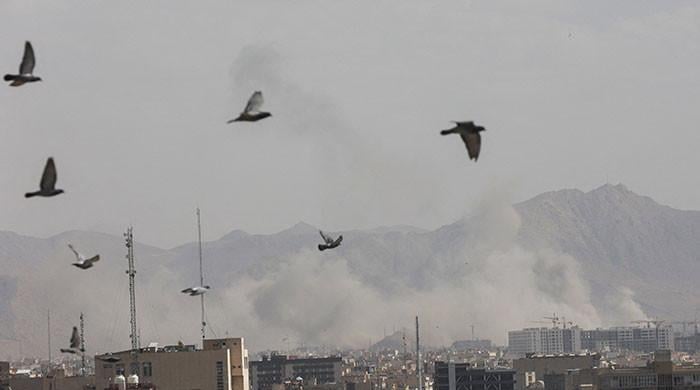Defining hate speech
The information minister has warned of a 'crackdown' on hate speech on social media, but not all 'hate speech' is necessarily a 'hate crime'
February 24, 2019

In its transparency report for January to June 2018, Google disclosed that the Pakistan Telecommunications Authority (PTA) had requested the removal of an open letter from concerned faculty members across several universities in Pakistan and abroad regarding academic freedom and increased repression on university campuses in the country.
The letter gave details of the dismissal of professors and cancellation of academic events that encourage critical thinking. The PTA claimed that the content of the letter constituted hate speech under Pakistani law. Google righty rejected the request.
This is just one example of how Pakistani authorities have attempted to use "hate speech" laws to silence critical, dissenting, or even unwelcome expression. Disturbingly, the federal information minister has warned of a "crackdown" on hate speech on social media, which has further prompted concern that such laws would be misused against political activists, human rights defenders, and individuals exercising their constitutionally protected rights to the freedom of expression.
Laws regulating 'hate speech'
Hate speech and related offences have been defined in vague and overbroad terms in a number of provisions under Pakistani law, which not just regulate but also criminalise a range of expression.
Section 11 of the Prevention of Electronic Crimes Act, 2016, criminalises dissemination of material that "advances or is likely to advance interfaith, sectarian or racial hatred", and prescribes a sentence of up to seven years imprisonment for the offence.
In addition, Section 8 of the Anti-Terrorism Act, 1997, prohibits using "threatening, abusive or insulting words or behavior" with the intention of stirring sectarian hatred, and carries a penalty of up to seven years imprisonment.
The Pakistan Penal Code also contains multiple offences that relate to "hate speech", including section 153-A, which criminalises the promotion or incitement of "disharmony or feelings of enmity, hatred or ill-will" between different groups, and prescribes a sentence of up to five years imprisonment.
Similarly, Section 23 of the Electronic Media (Programs and Advertisements) Code of Conduct, 2015, states that licensees shall ensure that "hate speech by any of its employees or any guest in a programme is not aired", and defines "hate speech" to include "any expression that may incite violence, hatred or discrimination on the basis of religion, ethnicity, colour, race, gender, origin, caste, mental or physical disability".
The provision also bars television channels from airing "allegations that fall within the spectrum of hate speech, including calling someone anti-Pakistan, traitor, or anti-Islam."
Principle of legality
As is evident from bare reading of these laws, they are glaringly vague and overbroad and appear incompatible with the principle of legality and international standards on the freedom of expression.
A key precondition to a fair trial, recognised globally, is that criminal offences must be prescribed by law and must conform to the principle of legality, which is also a general and universal principle of law. This means that they must be formulated clearly and precisely to ensure individuals can regulate their conduct accordingly. Vague laws undermine the rule of law because they leave the door open to selective prosecution and interpretation, based on discriminatory policies of government officials and the personal predilections of judges.
The Supreme Court of Pakistan has held, in the context of deciding on the legality of the Anti-Terrorism Act, 1997, that "every citizen has an inalienable right under the Constitution to know what is prohibited by law and what the law does not require him to do". The court interpreted this to mean that "the language of the statute, and, in particular, a statute creating an offence, must be precise, definite and sufficiently objective so as to guard against an arbitrary and capricious action on part of the state functionaries..."
Judicial interpretation
Not only are "hate speech" laws in Pakistan vague, courts too have failed to interpret them to provide greater clarity despite getting the opportunity to do so on a number of occasions.
Earlier this month, the Supreme Court in the Faizabad judgment urged intelligence agencies not to ignore those who "promote violence and hate" and directed the federal and provincial governments to "monitor those advocating hate, extremism and terrorism and prosecute the perpetrators in accordance with the law".
In the entire judgment, however, there was no discussion of the compatibility of the various "hate speech" laws in the country with the right to freedom of expression and other human rights, and no tests were laid out to determine what constitutes prohibited speech.
The Court's directions also appear contrary to the recommendations of the UN Special Rapporteur on the Promotion and Protection of the Freedom of Opinion and Expression, David Kaye, who in his thematic report last year warned against such "proactive monitoring or filtering of content, which is both inconsistent with the right to privacy and likely to amount to pre-publication censorship."
International standards
On the question of what constitutes prohibited speech, international standards are clear that expression cannot be restricted solely on the basis that it is offensive or insulting, and this includes speech that may be "hateful" – in other words, not all "hate speech" is necessarily a "hate crime".
Article 19(2) of the International Covenant on Civil and Political Rights (ICCPR) – to which Pakistan is a party – guarantees the right of everyone to freedom of expression. This right may only be subject to State regulation for the respect of the rights or reputations of others and the protection of national security, public order, or of public health or morals.
Additionally, Article 20(2) of the ICCPR obligates States to prohibit "any advocacy of national, racial or religious hatred that constitutes incitement to discrimination, hostility or violence". However, this does not give States a free hand to prohibit all expression that is deemed "hateful". The UN Human Rights Committee has interpreted Article 20(2) narrowly and in its jurisprudence has set out a number of conditions to determine when speech should be prohibited.
First, there must an "advocacy" element, which means that only statements made publicly with the "intent" of inciting hatred should be prohibited; second, there must be "incitement", which has been interpreted by the Committee to mean that it should be possible to reasonably anticipate that the speech would cause discrimination, hostility or violence in the specific context; and third, the provision only covers the civic status of protected groups – ideas or speech that is merely offensive may not be prohibited.
It is also important to note that while the ICCPR allows for speech to be prohibited in these narrowly defined circumstances, in most cases, the resort to the criminal law – particularly where there is an absence to incitement of violence – will not be necessary. The very long prison sentences for hate speech under Pakistani law, therefore, are disproportionate and unreasonable in such cases.
As the government considers a new "mechanism" to respond to hate speech, it must take these guidelines into account. Further, it must consider addressing root causes of "hate" and hostility, as experiences from around the world have shown that prosecution and censorship may be counter-productive to the aim of promoting inclusion and equality.
Omer is a legal adviser for the International Commission of Jurists. She can be reached at [email protected]











